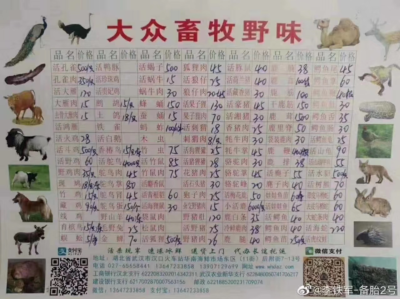
With more than 800 people infected and 26 confirmed deaths, a new virus outbreak from China has put a spotlight on the consumption of wildlife. While the government has stepped up its efforts to limit such consumption in response, WildAid is working with our partners in China and Vietnam to implement effective and long-term solutions.
The new coronavirus (known as 2019-nCoV) was first reported in Wuhan City, China, on December 31, 2019, and has since been detected in travelers to other countries. The Huanan Seafood Market in the central city of Wuhan came under scrutiny after experts suggested the new type of virus came from wild animals kept in unhygienic conditions and illegally sold for consumption. A menu circulating online lists animals like live foxes, crocodiles, civets, snakes, rats, seafood and other wildlife for sale.
China’s Ministry of Natural Resources, along with numerous other ministries have urged people to immediately stop consuming wildlife and in a recent social media post, they repeated that “refusing to eat wildlife is also a way to protect ourselves.”
The Chinese authorities had been “remarkably open” amid an “enormously demanding” situation, said Prof Neil Ferguson, the director of the MRC Centre for Global Infectious Disease Analysis at Imperial College in London.
Chinese authorities have issued daily briefings, putting in place strict measures to control the disease, including closing wildlife markets and banning travel in Wuhan, a city of 11 million people, as well as in 11 other nearby cities. China’s National Health Commission Vice-Minister Li Bin warned the flu-like virus can be transmitted from human to human and urged the public to minimize public gatherings. The timing of the outbreak is particularly worrisome as hundreds of millions of people are expected to travel for the Lunar New Year beginning on Saturday, January 25th.
“The openness and willingness by the authorities to quickly shut down the markets and call on the public to stop consuming illegal wildlife products has been very encouraging,” said WildAid China Representative Steve Blake. “Momentum to end this dangerous and often devastating consumption of wildlife has been building here for years, but this is the first time we’re seeing such a complete stance to end it from both the government and the public.”
The Chinese public has taken to social media to vent their frustrations, demanding stricter enforcement of wildlife markets and trade. A public service announcement with musician Jay Chou and WildAid, which warns the public about illegally consuming wildlife, has gone viral with over 14 million views in just a few days on Weibo.
“Some people think it’s clever to eat these cute animals, pangolins,” Chou says in the PSA. “In fact, it’s dangerous. There are serious risks of picking up parasites or catching diseases, and the scales for medicine? They’re keratin, just like your fingernails…and these animals are becoming endangered. Never eat pangolins or use their scales. When the buying stops, the killing can too.”
For 20 years, WildAid has been campaigning to end consumer demand for illegal wildlife products to save endangered species, which in turn can help protect public health.
Past epidemics like the Severe Acute Respiratory Syndrome (SARS) and the Middle East Respiratory Syndrome (MERS) have entered the human population from animals. China bans the trafficking of a number of wild species or requires special licenses, but many exotic species are still widely consumed illegally.
The coronavirus, which has no known vaccine, has also been reported in South Korea, Thailand, Japan and elsewhere outside China. This week, the Centers for Disease Control and Prevention confirmed the first U.S. case in which a man infected with the virus flew from Wuhan to Everett, Washington. Meanwhile, India, Nigeria, Japan and the United States have all implemented airport screening procedures. Symptoms of the virus include fever, cough or trouble breathing with serious cases leading to pneumonia, kidney failure and death.
Stay in touch and get the latest WildAid updates.
SIGN UP